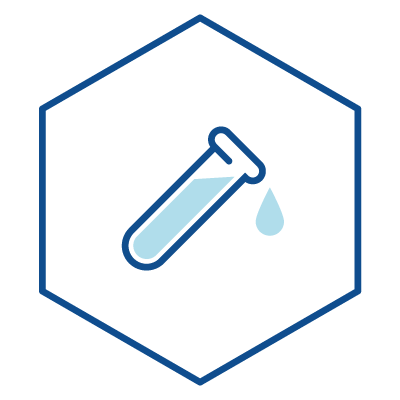

Enzyme ImmunoAssay (ELISA) for the one-step FAST qualitative determination of antibodies (IgG, IgM and IgA) to Treponema Pallidum in human plasma and sera. The kit is intended for the screening of blood units and the follow-up of Tp-infected patients. For “in vitro” diagnostic use only. Microplates are coated with purified Treponema pallidum synthetic antigens (p15, p17 and p47). Patient’s serum/plasma is added to the microwell together with a mix of Tp synthetic antigens, labelled with peroxidase (HRP). The specific immunocomplex, formed in the presence of anti Tp Ab in the sample, is captured by the solid phase. At the end of the one-step incubation, microwells are washed to remove unbound serum proteins and HRP conjugate. The chromogen/substrate is then added and, in the presence of captured immunocomplex, the colorless substrate is hydrolyzed by the bound HRP conjugate to a colored end-product. After blocking the enzymatic reaction, its optical density is measured by an ELISA reader. The color intensity is proportional to the amount of anti Tp Ab present in the sample. The version ULTRA is suitable for automated screenings
Enzyme ImmunoAssay (ELISA) for the determination of antibodies to Treponema pallidum (Tp) in human plasma and sera. The kit is for use in screening of blood units and the follow-up of Tp-infected patients. For "in vitro" diagnostic use only. Microplates are coated with purified Treponema pallidum synthetic antigens, derived from immunodominant protein of the bacterium. The solid phase is first treated with the diluted sample and captures antibodies if present. After the washing step, the specifically bound antibodies are detected with an anti-human IgG&M antibody, labeled with peroxidase (HRP). A substrate/chromogen solution is added and the intensity of the color developed by the bound enzyme is proportional to the amount of anti-Tp antibodies in the sample. Results are evaluated against a cut-off value able to discriminate Treponema pallidum antibody negative individuals from positive ones.
Third generation Enzyme Immuno Assay (ELISA) for the determination of antibodies to Tripanosoma cruzi (Tc) in human plasma and sera. The kit may be used for the screening of blood units and the follow-up of Tc-infected patients. For “in vitro” diagnostic use only. Tripanosomes are flagellar protozoa known to infect humans and cause the Chaga’s disease (T.cruzi) and the Sleeping Sickness (T.brucei). Chaga’s disease is mainly spread in south America countries but is known to be present also in south USA and some African regions.
3rd Generation Enzyme Immunoassay for the determination of antibodies to Plasmodium species in human serum and plasma. The kit is intended for the screening of blood units and the identification of people that came into contact with the protozoa and developed an immunological response. The kit is for in vitro diagnostic use only and the test has to be carried out by professional people, opportunely trained. Plasmodium species are obligate intracellular protozoa related to Babesia and Toxoplasma. Plasmodium species reproduce sexually in mosquitoes; mosquitoes transmit the resulting sporozoites into humans where the organisms reproduce asexually.
Fourth generation Enzyme ImmunoAssay (ELISA) for the determination of antibodies to Hepatitis C Virus in human plasma/sera & for the screening of blood units and follow-up of HCV-infected patients. For "in vitro" diagnostic use only. Microplates are coated with HCV-specific antigens derived from “core” and “ns” regions encoding for conservative and immunodominant antigenic determinants (Core peptide, recombinant NS3, NS4 and NS5 peptides). The solid phase is first treated with the diluted sample and HCV Ab are captured, if present, by the antigens. After washing out all the other components of the sample, in the 2nd incubation bound HCV antibodies, IgG and IgM as well, are detected by the addition of polyclonal specific anti hIgG&M antibodies, labelled with peroxidase (HRP). The enzyme captured on the solid phase, acting on the substrate/chromogen mixture, generates an optical signal that is proportional to the amount of anti HCV antibodies present in the sample. A cut-off value let optical densities be interpreted into HCV antibody negative and positive results.
Enzyme ImmunoAssay (ELISA) for the qualitative determination of antibodies to Human T-cell Lymphotropic Virus type I&II or HTLV I&II Ab. The kit is for use in screening of blood units and the follow-up of HTLV I&II-infected patients. For "in vitro" diagnostic use only. HTLV I&II are retroviruses not related genetically to HIV1&2; however, they have similar routes of transmission and can have extremely long period of latency prior to manifestation of disease.HTLV I is endemic in southern Japan, the Caribbean and the US and many other scattered population trough the world.HTLV II is endemic in some native American populations but is detected mostly in intravenous drug users and their sexual partners. HTLV I&II are transmitted transplacentally, parenterally, by sexual contacts and by infected blood.ELISA has been applied to the diagnosis of HTLV I&II serology by detecting specific antibodies in plasma and sera.
Fourth generation Enzyme Immunoassay (ELISA) for the one-step determination of Hepatitis B surface Antigen or HBsAg in human plasma and sera & for the screening of blood units. Able to detect HBsAg mutants and find application in the follow-up of HBV-infected patients. For "in vitro" diagnostic use only. The World Health Organization (WHO) defines Hepatitis B Virus infection as follows: "Hepatitis B is one of the major diseases of mankind and is a serious global public health problem. Hepatitis means inflammation of the liver, and the most common cause is infection with one of 5 viruses, called hepatitis A,B,C,D, and E. All of these viruses can cause an acute disease with symptoms lasting several weeks including yellowing of the skin and eyes (jaundice); dark urine; extreme fatigue; nausea; vomiting and abdominal pain. It can take several months to a year to feel fit again. Hepatitis B virus can cause chronic infection in which the patient never gets rid of the virus and many years later develops cirrhosis of the liver or liver cancer.
Fourth generation Enzyme Immunoassay for the determination of antibodies to Human Immunodeficiency Virus or HIV type 1&2&O and P24 HIV-1 Antigen in human serum and plasma. This kit is intended exclusively for In vitro diagnostic use in an authorized clinical laboratory and the test has to be carried out by specifically trained health-care professional personnel. Epidemiological evidence indicates that an infectious agent transmitted through intimate contact, intravenous drug use or use of infected blood or blood products leads to Acquired Immunodeficiency Syndrome (AIDS). This disease affects T-cell mediated immunity, resulting in severe lymphopenia and a reduced subpopulation of helper T-lymphocytes. Destruction of this T-lymphocyte population by the virus causes an immune deficiency, resulting in a reduced or deficient response to subsequent infections. Consequently, infections become more severe and may cause death. At present, there is no successful treatment for AIDS. The etiological agent has been identified as a retrovirus, human immunodeficiency virus type 1 (HIV-1). A closely related, but distinct type of immunodeficiency virus, designated HIV-2, has also been isolated. This virus causes a disease that is indistinguishable from AIDS. Serological cross-reactivity between HIV-1 and HIV-2 has been shown to be highly variable from sample to sample. This variability requires the inclusion of antigens to both HIV-1 and HIV-2 for the screening of antibodies to HIV-1 and HIV-2. The presence of anti-HIV-1 and/or anti-HIV-2 and/or HIV p24 antigen in the blood indicates potential infection with HIV-1 and/or HIV-2 and consequently this blood should not be used for transfusion or for manufacture of injectable products.
Competitive Enzyme ImmunoAssay (ELISA) for the determination of antibodies to Hepatitis B core Antigen in human plasma and sera. The kit is for use in screening of blood units and the follow-up of HBV-infected patients. For "in vitro" diagnostic use only. The assay is based on the principle of competition where the antibodies in the sample compete with a monoclonal antibody for a fixed amount of antigen on the solid phase. A purified recombinant HBcAg is coated to the microwells. The patient’s serum/plasma is added to the microwell together with an additive able to block interferences present in the sample. In the second incubation after washing, a monoclonal antibody, conjugated with Horseradish Peroxidase (HRP) and specific for HBcAg is added and binds to the free rec-HBcAg coated on the plastic. After incubation, microwells are washed to remove any unbound conjugate and then the chromogen/substrate is added. In the presence of peroxidase enzyme the colorless substrate is hydrolyzed to a colored end-product. The color intensity is inversely proportional to the amount of antibodies to HBcAg present in the sample.


